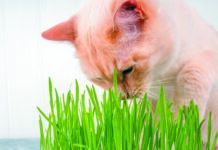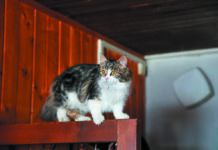Those disappointed with their cat’s ho-hum response to catnip have an alternative in silver vine, more commonly used in parts of Asia where it is referred to by its Japanese nickname, matatabi. That’s short for “matatabi dance” or “travel again,” for cats’ wriggling movements along the floor when under the plant’s euphoria-inducing influence.
It turns out that more cats are attracted to and benefit from silver vine than catnip. In a study of 100 cats at different locations in the United States that was conducted with the help of researchers at the Institute of Organic Chemistry in Braunschweig, Germany, it was discovered that while 68 percent of the felines responded to catnip, nearly 80 percent responded to silver vine. Moreover, more than seven out of 10 cats that did not respond to catnip did respond to silver vine.
Catnip is higher in nepetalactone, an essential oil that, when inhaled, often lights up a cat’s olfactory bulb, hypothalamus, and amygdala—all part of the brain. But silver vine has higher amounts of other compounds that replicate nepetalactone’s effect.
The popularity of silver vine as a feline “recreational drug” has been on the rise, with increased sales of Meowijuana brand chew sticks that also help clean teeth; plant-stuffed plush toys; and chewable, chasable stick-cage balls. That’s in addition to loose powders and leaves. The only caveat is that you should be present while your cat enjoys silver vine, particularly in stick form, in case of accidental choking if a piece falls off.
Silver vine, which often causes cats to rub their faces and bodies into the plant, happens to be a natural mosquito-repellent, just like catnip. And you can rest easy knowing that, like catnip, it is safe and non-addictive. If your cat has been missing the stimulation, euphoria, and pleasure of catnip because he simply doesn’t respond to it, let the good times roll.




